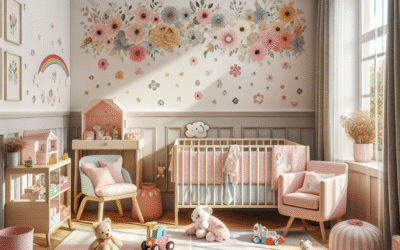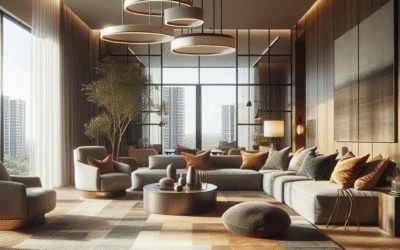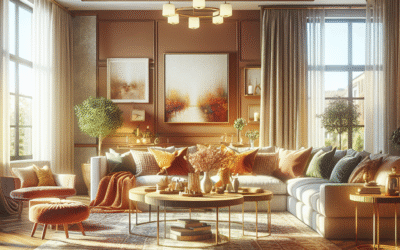
Accent walls can transform a space, adding depth, interest, and personality. Among the myriad of options available today, textured finishes stand out as a trend that can elevate your interior design game. In this guide, we’ll explore various textured finishes for accent walls, detailing techniques, materials, and creative ideas to inspire your next home improvement project.
What is an Accent Wall?
An accent wall is a single wall in a room that is painted or treated differently from the other walls to create a focal point. This design element can enhance the overall aesthetic by adding color, texture, or ornamental detail. Textured finishes on accent walls are particularly effective at drawing attention and creating contrast.
1. Types of Textured Finishes for Accent Walls
When it comes to textured finishes, there are numerous options to choose from. Here are some popular techniques:
1.1. Venetian Plaster
What It Is: Venetian plaster is a traditional Italian technique made from lime, marble dust, and pigment.
Benefits: This finish creates a luxurious look and can be polished to a high sheen.
Best For: Elegant settings, such as dining rooms and master bedrooms.
1.2. Fabric Wall Coverings
What It Is: Fabric wall coverings come in various textures and patterns, enhancing the tactile quality of an accent wall.
Benefits: Fabrics like silk or linen can add warmth and softness to a room.
Best For: Bedrooms or cozy reading nooks.
1.3. Stretched Canvas
What It Is: This involves stretching a canvas over the wall, which can then be painted or left in its natural state.
Benefits: It provides a movable art piece while retaining an organic look.
Best For: Art studios or creative spaces.
2. Techniques for Applying Texture
Knowing how to apply the finish can make or break your project. Here are some effective methods to create textured accents:
2.1. Roller and Brush Techniques
Using specific rollers or brushes can create a range of textures, from stippled to brush-stroke patterns.
Steps:
- Prepare the Wall: Clean and patch any imperfections.
- Select Your Paint: Use textured paint or add texture additives.
- Apply: Use a roller for large areas and a brush for details.
2.2. Trowel Application
This method is most commonly used for Venetian plaster or similar finishes.
Steps:
- Mix the Plaster: Follow manufacturer instructions.
- Apply: Use a trowel to apply the plaster in thin, even coats.
- Finish: Burnish the surface for a smooth finish.
2.3. Stencil Techniques
Using stencils can add intricate designs to your textured accent wall.
Steps:
- Choose a Stencil: Find a design that complements your decor.
- Secure the Stencil: Tape it to the wall.
- Paint: Use a sponge or brush to apply your chosen paint.
3. Creative Ideas for Textured Accent Walls
Here are some innovative ways to incorporate textured finishes into your space:
3.1. 3D Wall Panels
Material: Made from wood, MDF, or gypsum, 3D wall panels create a striking visual effect.
Idea: Use panels to form geometric shapes or organic patterns that draw the eye.
3.2. Painted Murals
Technique: Instead of a single color, create a mural that tells a story or portrait with textured layers.
Idea: Consider themes that resonate, such as nature, cityscapes, or abstract art.
3.3. Stone or Brick Exposed Walls
Material: Real stone or colored/painted faux brick adds an earthy, raw element.
Idea: Pair it with contemporary furniture for a modern rustic look.
4. Maintenance and Care for Textured Finishes
Textured finishes may require specific cleaning methods to maintain their appearance. Here are some tips:
4.1. Regular Dusting
Why: Dust can accumulate in the grooves of textured finishes.
How: Use a soft cloth or feather duster to gently remove dust.
4.2. Spot Cleaning
For stains, a damp cloth with mild soap can usually do the trick. Always test a small area first.
4.3. Re-painting
Some textured finishes may need re-painting every few years, depending on wear.
Tip: Choose paint specifically formulated for textured surfaces for better adhesion and finish.
5. Final Tips for Choosing Your Accent Wall Texture
When deciding on a textured finish, keep these considerations in mind:
5.1. Room Function
Make sure the texture aligns with the room’s purpose. Cozy textures work well in living spaces, while sleek finishes fit best in modern spaces.
5.2. Color Cohesion
Select textures that complement your color scheme to maintain visual harmony.
5.3. Lighting Effects
Textures can alter how light interacts with walls. Test different lighting conditions to see the effect before committing.
Frequently Asked Questions
Frequently Asked Questions
Can I texture a wall myself?
Yes, many textured finishes can be DIY’d with basic tools. However, always follow specific guidelines for the finish you choose.
What type of paint works best for textured finishes?
Choose a high-quality acrylic or latex paint that is suitable for the specific texture and finish type.
How do I know if a texture is right for my space?
Consider the overall style and function of the room, as well as the color scheme, lighting, and desired ambiance.
Conclusion
Textured finishes for accent walls are a unique way to bring personality and depth to any space. From elegant Venetian plaster to playful fabric wraps, the options are abundant and can be tailored to fit any home. With the right techniques, materials, and maintenance, your textured accent wall will remain a stunning focal point for years to come.
By following the guidelines in this article, you can achieve an unforgettable accent wall that adds value and style to your living space. Embrace the beauty of texture today!
Categories
- Accent Walls & Ceilings (61)
- Art Curation & Gallery (62)
- Bedding Style Trends (68)
- Bedroom Makeover (81)
- Bohemian & Eclectic Styles (58)
- DIY & Budget-Friendly Decor (64)
- Eco-Friendly Design (62)
- Furniture Care (71)
- Home Decor & Design Ideas (162)
- Home Wellness Spaces (59)
- Integrated Outdoor Living (67)
- Japandi Style (61)
- Kids and Nursery Decor (59)
- Living Room Decor (79)
- Mix & Match Techniques (73)
- Modern & Contemporary Design (66)
- Rug Sizing & Placement (73)
- Scandinavian Design Inspiration (20)
- Seasonal Home Decor (79)
- Small Space Solutions (73)
- Wall Art & Painting Tips (77)
Recent Comments
Archives
Product Gallery
-
Large Area Green Rugs for Bedroom Nordic Living Room Decoration Shaped Carpet Irregular Plush Lounge Rug Home Thick Washable Mat
Rated 5.00 out of 5$36.00 – $225.00Price range: $36.00 through $225.00 -
Nordic Style Rugs for Bedroom Morandi Living Room Decoration Carpet Large Area Geometry Lounge Rug Home Cloakroom Non-slip Mat
Rated 5.00 out of 5$26.00 – $388.00Price range: $26.00 through $388.00 -
Irregular Shapes Living Room Decoration Carpet Modern Style Rugs for Bedroom Home Thicken Plush Rug Fluffy Soft Lounge Floor Mat
Rated 4.83 out of 5$37.00 – $226.00Price range: $37.00 through $226.00














